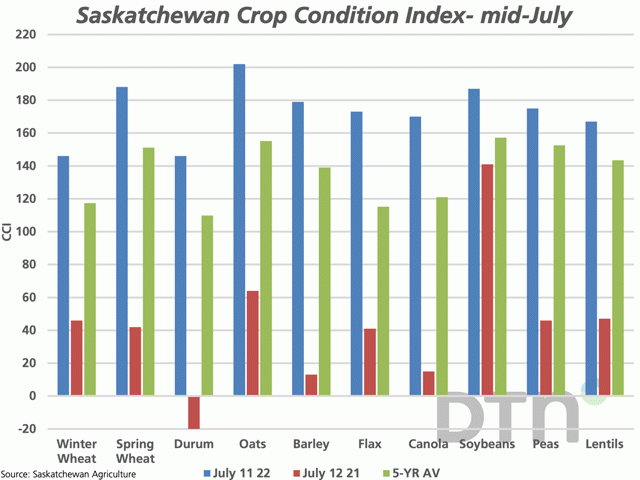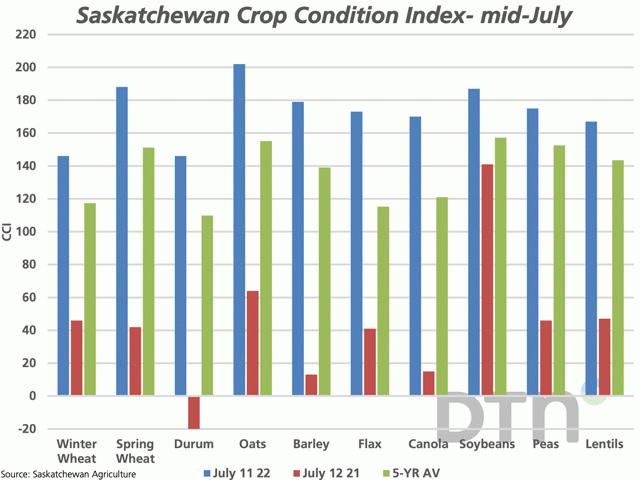Canada Markets
Saskatchewan Mid-July Crop Condition Ratings
Saskatchewan's Crop Report as of July 11 points to a wide range of conditions and needs across the province, with more precipitation needed across the southern and western parts of the province, while the east would benefit from warm and dry conditions that would help advance crops.
The crop assessment for the Southeast Region and the East-Central Region are estimated as fair to excellent, while the Northeast Region is rated good to excellent, with all three rated as good in the previous week.
On the western side of the province, the Southwest Region and West-Central Regions were rated Fair to Good and the Northwest Region was rated Fair to Excellent, with the Southwest Region unchanged over the past week while both the West-Central and Northwest Regions were rated good in the previous week.
As seen on the attached chart, the crop condition index for the crops selected (blue bars) are well-above year-ago levels (red bars) and the five-year average for this week (green bars). Of the crops shown, the calculated index is below the levels reported for this week in 2020, except for oats, where the index is 2 points higher than reported in 2020 and the highest of any year reported in at least the past five years.
P[L1] D[0x0] M[300x250] OOP[F] ADUNIT[] T[]
When comparing to the five-year average, the CCI for spring wheat as of July 11 is 36.2 points higher than average, 36.2 points higher for durum, 46.8 points higher for oats, 40 points higher for barley, 49 points higher for canola, 29.8 points higher for soybeans, 22.4 points higher for peas and 23.6% higher for lentils.
There have been recent media pieces pointing to the potential for an average crop, while this study would support that idea based on this week's estimates.
The crop does remain late. An estimated 64% of the fall cereals, 58% of the spring cereals, 51% of the oilseeds and 72% of the pulse crops are estimated to be at normal growth stages. During the past two weeks, this percentage has remained steady for spring cereals while there has been some improvement for both oilseeds and pulses.
There was a slight deterioration noted in the estimates for topsoil moisture this week, with 69% of the province rated as having adequate topsoil moisture, down 2 points from the previous week. The area rated short to very-short topsoil moisture rose from 20% to 27% over the past week. This compares to the year ago rating of 14% adequate, 41% short and 45% very short.
This week's above-normal temperatures will aid in crop development, with highs across the province to range from 4 to 9 degrees Celsius above normal through July 18. At the same time, DTN's July 14 forecast shows a shift south in the pattern that is forecast to bring rain to the southern areas of the province next week, certainly beneficial to western areas of the province while may prove detrimental to crops in eastern areas and bears watching.
See more about weather for the Canadian Prairies, including the latest drought conditions and forecast, from DTN Ag Meteorologist John Baranick at https://www.dtnpf.com/….
Cliff Jamieson can be reached at cliff.jamieson@dtn.com
Follow him on Twitter @Cliff Jamieson
(c) Copyright 2022 DTN, LLC. All rights reserved.






Comments
To comment, please Log In or Join our Community .